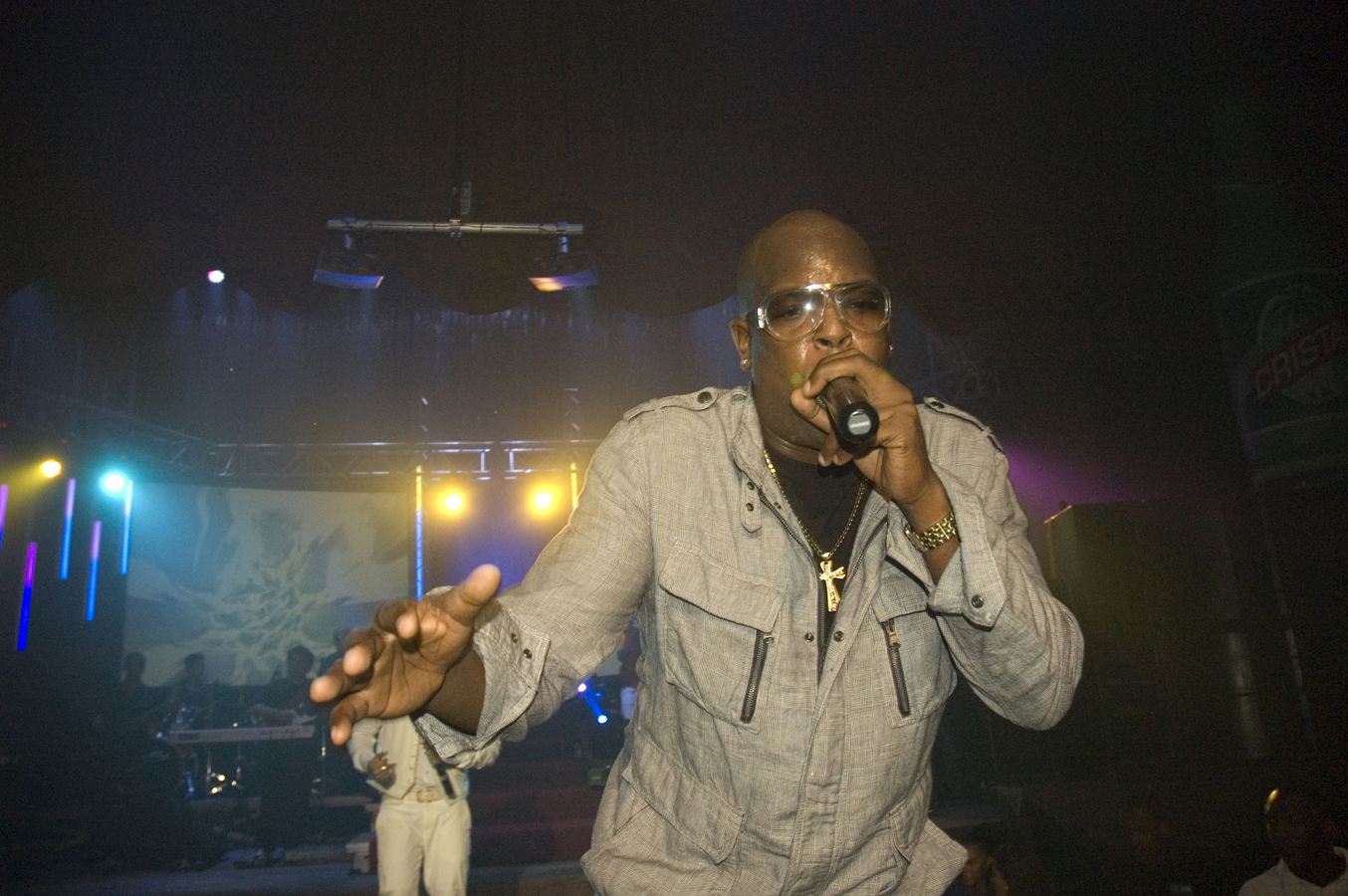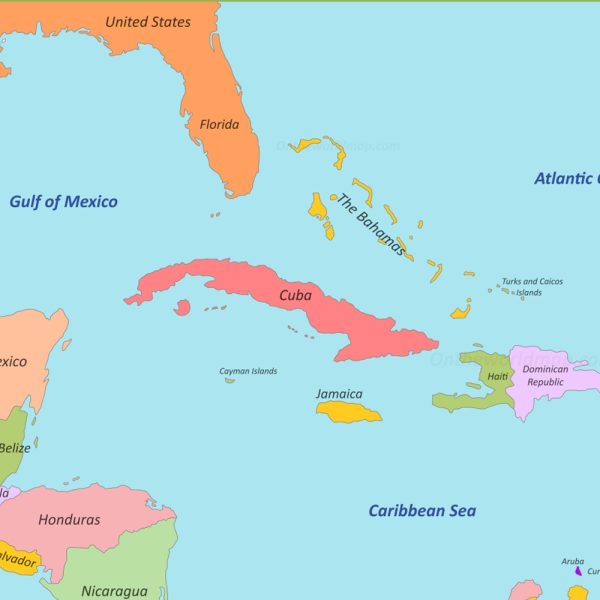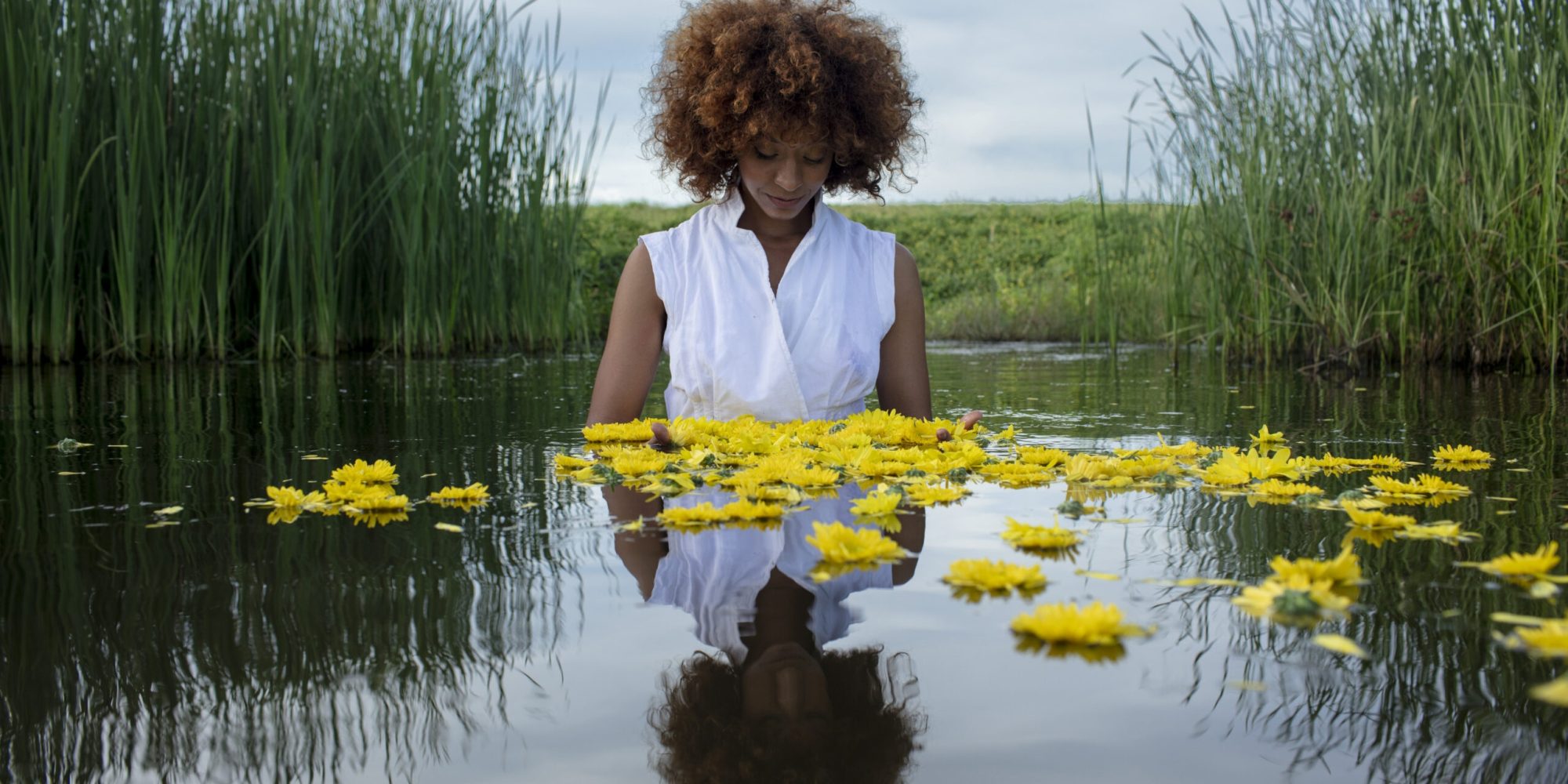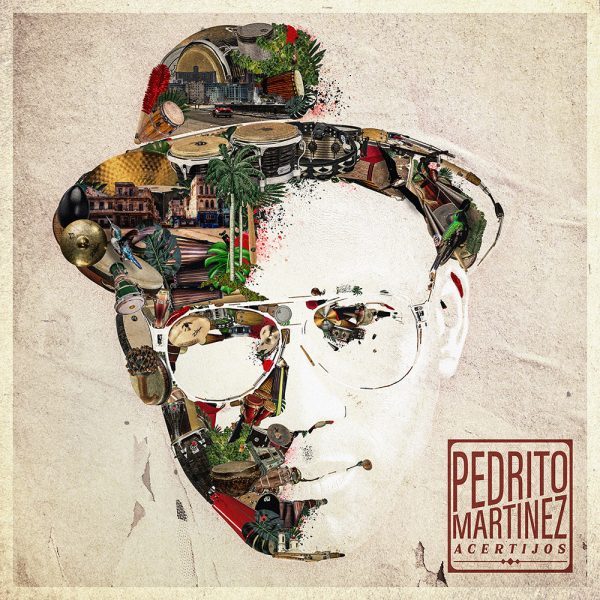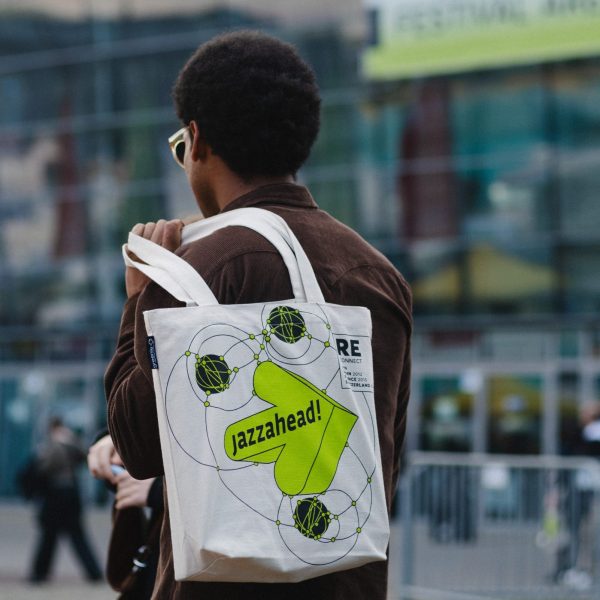Yilian Cañizares was born in 1983 in Havana, Cuba. As a child, her family dreamed for her to become an athlete as her father had founded a school for athletes. But young Yillian was more attracted to music. So when she was just four, her mother took her to see a woman who ran a children's band to see if her daughter had talent for music. The teacher said her daughter definitely had talent. And so she began singing with this band every weekend. Next, at seven years old, Cañizares decided she wanted to learn piano. After much nagging, her mother relented and took her to a music school. At that end of a presentation of watching students play all these different instruments, Cañizares changed her mind and told her mother she wanted to learn to play the violin. So she began studying both piano and violin, eventually winning the Cuban National Violin Contest four times.
When she was 14 years old, she was offered a music scholarship in Caracas, Venezuela. Taking a masterclass there with a visiting teacher from Switzerland led to her move to Europe to further her studies in 2000. She was active playing classical music concerts, but discovering manouche jazz violinist Stéphane Grappelli, was a revelation for her. She has said she was feeling lost in the classical world at the time, and through listening to Grappelli she realized there had to be a way to translate her origins and history as well through the violin. Eventually, she formed a jazz quartet, dubbed Ochumare (the Yoruba rainbow-serpent god). The group fused Yoruba songs, Latin jazz, and even some classical. In 2008, they won the Montreux Jazz Festival Competition.
In 2015, Cañizares released her debut album, Invocación, which further brought together all her influences. Each of the tracks pays homage to a person who had influenced her, personally or musically.
Over the ensuing decade, Cañizares has collaborated with artists including fellow Cubans Chucho Valdés and Omar Sosa, French-Lebanese trumpeter Ibrahim Maalouf, and Tunisian oud player Dhafer Youssef.
Her 2018 album, a collaboration with Omar Sosa, entitled Aguas, led her to become a United Nations “Ambassador of the Oceans.” Cañizares writes, “I have not tired of repeating on my social networks and in numerous settings around the world why I feel that it is essential that we preserve the source of life on our planet.”
A year later, she released Erzulie (the Haitian goddess of peace and freedom) after an inspirational trip to Haiti. Cañizares describes the album as a “history of Africa through its Creole children: Haiti, Cuba and New Orleans.” She recorded the album in New Orleans with the likes of Michael League and Chief Xian aTunde Adjuah (a.k.a. Christian Scott) and others, and it earned her nominations for best artist and album at that year's Songlines Music Awards.
Cañizares released a five-song EP during the pandemic, appropriately named Resilience, and her latest album Habana-Bahia, in 2023. Again, this album was part of her exploration of the many paths the Yoruba traditions have traveled throughout the African Diaspora. She recorded the album in Salvador de Bahia.
When Cañizares came for our interview at the Jazzahead conference press area last month in Bremen, Germany, it was like one of those TV commercials where all heads are compelled to turn in her direction, and time freezes except for her walking towards you. We were obviously charmed by her. The following has been edited for clarity and length.
Thumbnail photo © Eric van Nieuwland.
Ron Deutsch: At your showcase, you spoke about calling upon the Orishas, the divine spirits of the Yoruba tradition, which you channel through your music. I've interviewed other Cuban artists who have spoken about this as well. They've explained to me that there's no real fine line between performance and ritual when they go on stage. Would you agree?
Yillian Cañizares: I agree. Yeah. Because there's no fine line either in our life with that. We live with this spirituality in our everyday life. I live like this as a Cuban. And for me, going on a stage is a ceremony. It's a spiritual thing. It's a way to say thanks to the ancestors that made possible this moment to all the Orishas that protect us. I need to use my violin and my voice as a vehicle to give back to this culture a little of what I have received from it. So it's really important, and this is also what connects me with my peers, my friends, my musicians. We, together, before going on stage, we don't go just to play. It's about delivering a message that we carried from our ancestors and then trying to spread humility.
Can you break down a bit more about the message? Is it something more or specific than say “peace and love?”
Well, we could say peace and love, but it's more than peace and love. Because as a human, as a woman coming from Cuba, being Black, I have my own experience about what life could be. But I have also experience – and I'm grateful enough for that – to being able to travel to many, many places through music and to meet many other humans that don't look like me, that don't speak the same language. But when you put this in a bigger perspective, when you see the bigger picture, you understand that we are part of a very tiny, ridiculous point in the universe that we call our home, that is this planet. And for me, the message is that no matter if you're a woman, a man, if you're Black, if you're whatever, if you're from Cuba, if you're from South Africa, from Norway, we are humans. And we need to heal – maybe if you want to use the term healing – from the hate that we humans cultivate sometimes between each other. For me, it's very powerful to see how a music that some people don't understand when I speak, or when I sing in Spanish – and even less when I sing in Yoruba, the language of my ancestors – can go through this border barrier and get straight into the heart. You don't need to understand exactly what I'm saying to feel from the place where it's coming. And I feel that music has this power of opening the chakra of the heart and to pass this message of “Why don't we just understand that we are brothers and sisters?” And I'm trying each time, like this is our intention. This is why when you saw the show yesterday we started with the sample of Toni Morrison talking about racism, because this is our starting point to say all this is just ridiculous. We are in such a tiny spot in the universe and we are just human. This is our big and common point that we cannot and we should not forget. So I'm trying with all my heart to deliver this message.
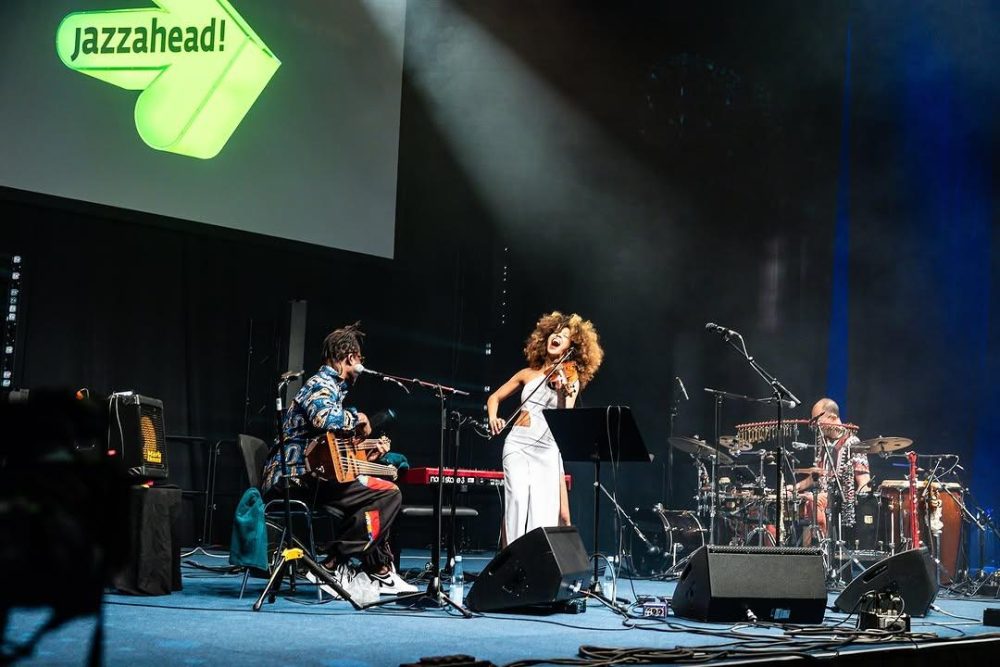
You were classically trained and you were on that path, playing with orchestras, but then you changed course away from the “Western tradition.” And so I'm wondering if there was a feeling that you were playing someone else's tradition and not your own, which was part of your decision to make this change?
Yes. Maybe not in a conscious way, but in a subconscious way, yes. Because of many reasons. It's true that in Cuba we have this very strict classical training. Myself, I learned the violin with a Russian teacher, so you can imagine how strict the discipline that I had. And on the other side, I was lucky enough to be in Cuba where the power of this spirituality is everywhere. So I could not escape from that. And at some point in my life, I felt that the music that I was playing wasn't me. It wasn't representative of the person I am. And I started asking myself, “Why are you doing this music?” Because I have sacrificed so many things in my life because of my love for music. I left my family very early. I left Cuba when I was 16. All this for music. So at some point, it’s like, “Why are you doing that? What is the reason?” If it's not that you have the mission to express through your music your truth, your truth in this moment in life, because this truth has also evolved and changed. And this completely changed my perspective because I couldn't do that through classical music. Only through the music that allowed me to connect with what I felt in this moment and to allow me to be free and to go wild.
It's very funny because yesterday after the concert I met a person and when he saw me he was like, “Oh, you are totally a different person on a stage than outside the stage.” I didn’t see myself like that. For me, I know I'm Yilian.... But it's true that in my everyday life, I'm very sweet and calm, and even maybe shy. And on a stage, it's like I'm fearless.
But it's hard work, you know, to try to every time take out all the shells, and try to get naked – in a metaphoric way – to touch what your soul needs to say, to get in touch with, like, “Listen to me.... Don't use a mask. Don't try to do a beautiful thing if you're not feeling it.” This is, for me, so important as an artist, especially when I'm composing and trying to... And this is very hard to do because sometimes you don't want to get there, because sometimes you know it's painful. It's scary sometimes, and sometimes also you are afraid to be judged and what people would say. But you can only speak in a universal way, if you speak from your very private and very specific truth. I really believe that.
Part of the impetus for you to question the path you were on in the beginning was when you first heard Stéphane Grappelli.
It was a revelation because until then I heard the violin, of course, a lot in a classical world and in traditional Cuban music, these kind of things, but never like in a jazz way, you know. I thought that jazz was for pianists, trumpet players and saxophone players. And then I heard this and I was like, “Wow, it's amazing.” And what is fun is my goal was never to do what Grappelli did, but it was to take his example and do the same with my own tradition. I said to myself, “If he was able to do this with his tradition, I should be exploring what can I do with my own tradition, with my violin.”
Specifically, in what way did that manifest?
Well, I started improvising more on the violin, with the Cuban jazz standards. Like how, if the trumpet is not playing that, how would we sound with violin? And you know it's very funny because nowadays, I have had the privilege and the honor of playing with one of my biggest heroes, Chucho Valdés. So, it's very funny. With him, I'm playing many of the tracks, the songs that he recorded with the band Irakere, but never with violin. I took these songs to my violin because it's my instrument. I started there saying, “Okay, if I'm playing with the record, and if there were not a trumpet, imagine it's a violin. What would you do?” And exploring that. I had no idea where I was going. I was completely like, I would hear a phrase and it makes no sense to me. But it's like, “You need to jump up to nothing and then the floor will appear.” It's not that you see the floor and then... No, you need to go with the blind faith and this process was kind of that. I didn't have the slightest idea what I was doing, but my soul was heading me somewhere, and I needed to follow this path. And now he loves it and we have fun. He's the greatest. And every time I play with him, it's like a master class, but also a lesson in humility. And I would hope for myself to grow older like him with the same passion for music and the same kindness in his heart.
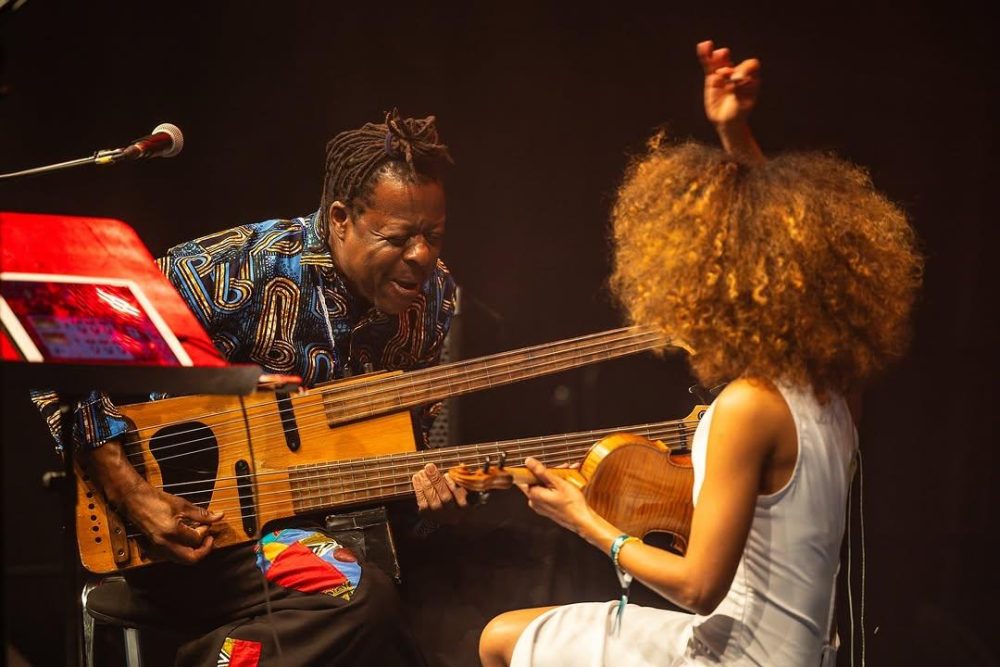
That's so amazing that you started playing to recordings of Chuco Valedés and then to find yourself actually playing with him. That must have been mind-blowing for you.
Yes. So I was playing his music way before that we had the opportunity of playing together. When he asked me to play together I remember very well, I was touring with Omar Sosa and I was in Japan. And I received an email from him saying, “Yilian, we are playing in a few days in the same festival in France, and would you like to play with me?” And I was like, “Is this happening?” And every time we were kind of meeting at the same festivals, but not playing together. And every time he was like, “I follow what you are doing. I follow you, Yilian. Keep going.” And it was already a great gift to have these words from him. But I never expected him to call me and say, “I want us to play together.” So when this happened, I remember before my show in Tokyo, I went to my hotel room and I just learned the music for a song he chose. And then this moment happened, and I will never forget that. It was one of the most beautiful days in my life. And I remember that at the end – I have the picture of that – he was smiling. He was so happy. And then he stood up and he bowed down to me. And then I was like, “Oh my gosh! this is happening!” And I said the same to him. For me, it's priceless, you know. It was like he was saying ,“Go girl! Now fly with me! Don't be afraid! You have the wings and you have the power and the possibility to do it.”
Are you planning to do a project with him?
I would love to. We have discussed this. We have a few ideas. But anything I could make with Chucho, anything I could to do make to make him happy, I will do it.
I'll always remember during the pandemic, he would do a little daily concert online and it was something reassuring during those times.
It was so important. My mom, for her, like the best moment of the day during the pandemic. She was, like, “Chucho is playing.” And it was so important. We were talking before about the mission of art and it's not how well I play, it's not how famous I am. It's also not: “I'm the best, or not the best.” It's what he was doing – “I'm there for you. My art, my music is there for you when you need it the most.”
I feel like you began going back to Cuban music as a way to build and keep that connection alive while living in Europe, and to have it express this part of you. But also, you've gone further and have used music to seek out all these other connections to sort of almost create a larger “pan -Caribbean” and/or maybe a “pan-South America” identity. I'm thinking of both your album Erzulie, which was inspired by a trip to Haiti, and then Habana-Bahia,which you recorded in Brazil. And you’ve spoken about how all these cultures also connect with the Yoruba traditions.
Pan-African also, I would say. Yes, definitely. I consider myself as a citizen of the world.
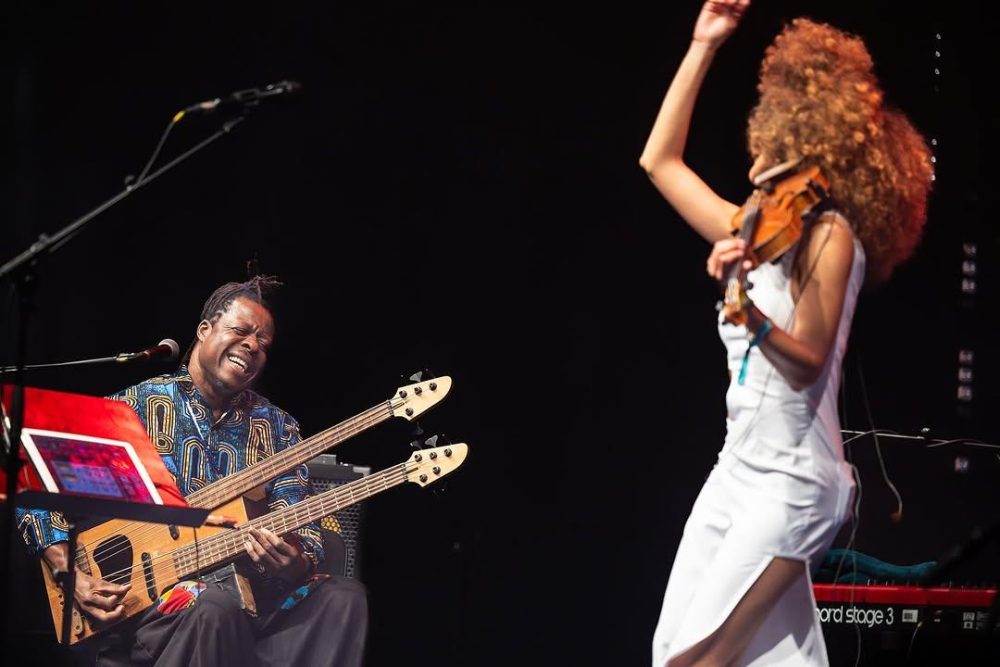
Also, I've thought a lot about how as an immigrant you both want to fit in, but also stand out. To be recognized and accepted for who you are, where you come from, etc., while also not wanting to call attention as being “different.”
Yes, but it took time for me. Because the beginning was really difficult. You want to be accepted, especially when you first come. You know, immigration is a hard process and you want to be accepted and you want to be loved and you want to evolve also. And I remember something else that could seem superficial, like my hair. It took a long time for me before letting my hair be wild, to accept my hair in a natural way, because I wanted to fit into the European society. And I have already another color and I have already, you know, being a classical training musician playing violin, being Black, it was already like.... And I didn't want this to be, you know? And little by little, I remember when I changed. At the beginning, I was so afraid of what people would say, how they would look at me, and it's true that everybody looked. But this is how nature makes me.
So tell me about being the United Nations “ambassador to the oceans.”
Ambassador is maybe not the right term because it's very political. It's like a “voice of the ocean” or “ocean advocate.” It's because, you know, I come from Cuba, and we have a special relationship with water. I'm very much concerned about what we as humans are doing to our planet. And it's beautiful to be able to put my music at the service of something that I really care about.
But how did that happen?
It's very funny. Just before the pandemic, I was touring in the U.S. with Omar Sosa, in our collaborative project, and it happens that in New York, one of the guys who run this project, the World Oceans Day, was at the concert. He just fell in love with the message, with the music, and that's how everything starts. I just wrote the song for them, “Yemayá,” to deliver the message of how we can take care of our planet through my music.
And you introduced it at this virtual conference sponsored by the United Nations in 2021.
Yes. It calls on Yemayá, the Yoruba goddess of the sea to help humanity to heal the pollution of the oceans and to respect Mother Earth. And it's beautiful also to see the reaction of the people when you talk about that. Sometimes they never expect, you know, you are playing and you are singing and then you say, “Okay, but my music has a few levels of understanding and I want you to go deeper with me.” I'm invested in this project because I believe that if we humans are the problem, we are also a solution. And it's beautiful to see how they receive this.
Are you working on any new projects?
Yes. I'm very focused on finishing my upcoming album, which I will release as an EP in this autumn, and then the full album in February 2026. The name of the new album is Vitamina Y, like Y for Yilian.
Thank you so much.
Thank you.
Related Audio Programs
